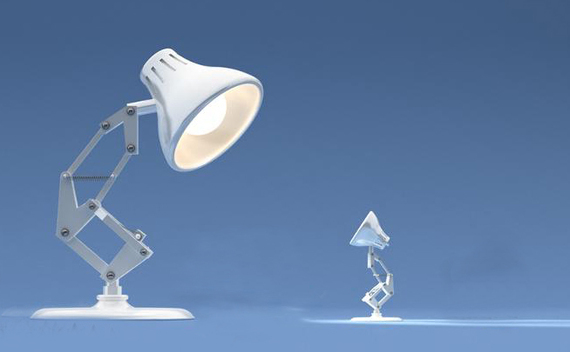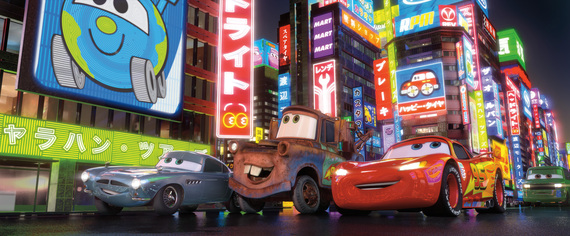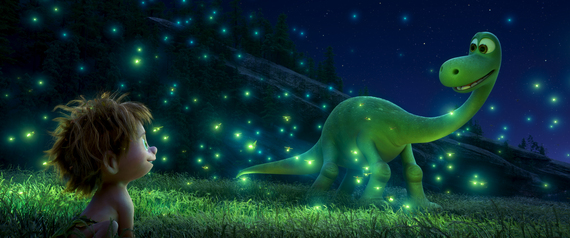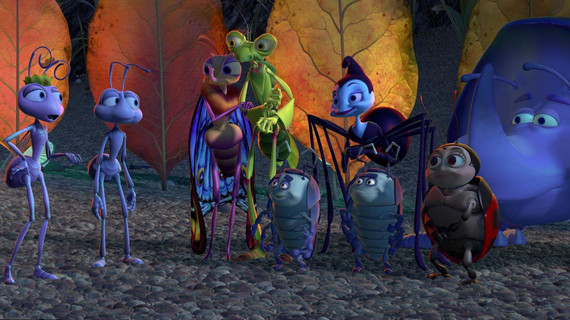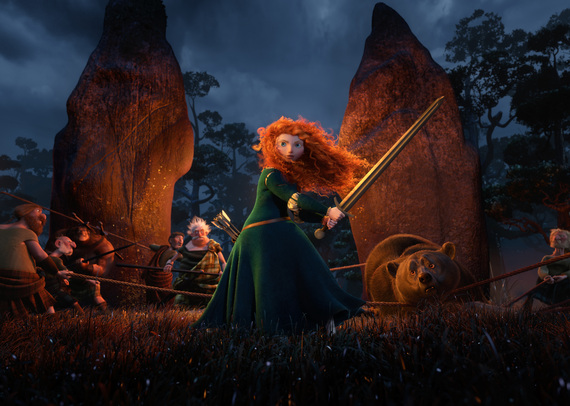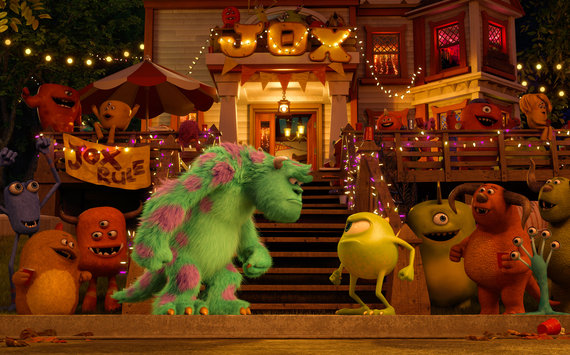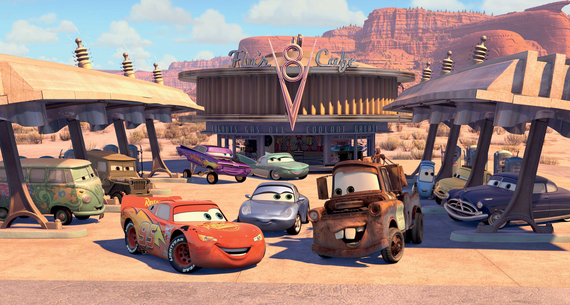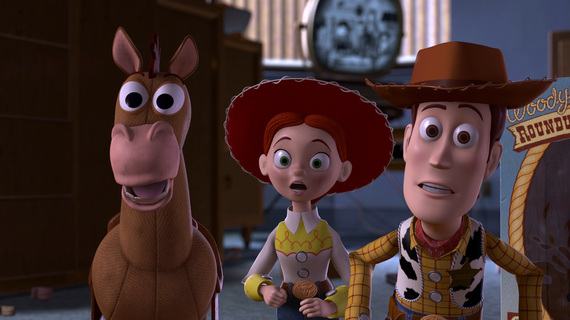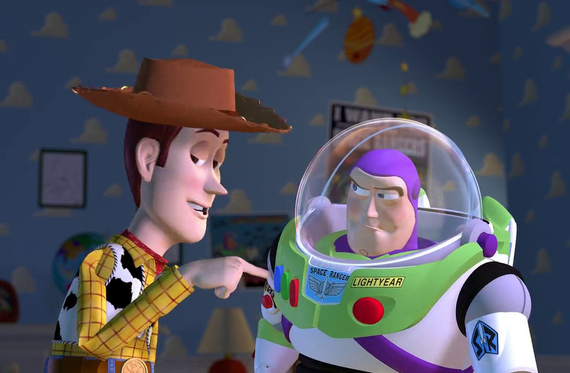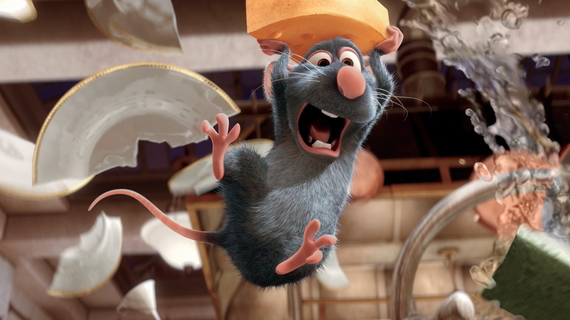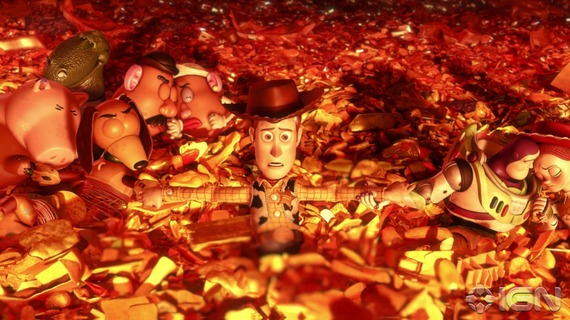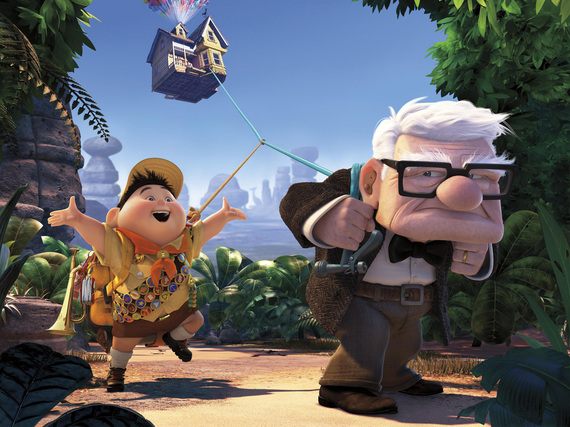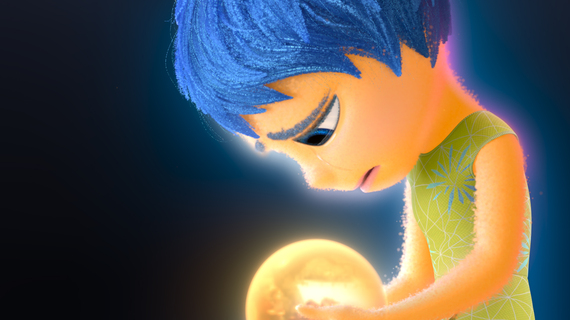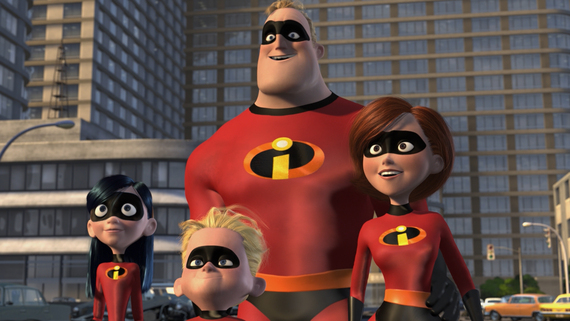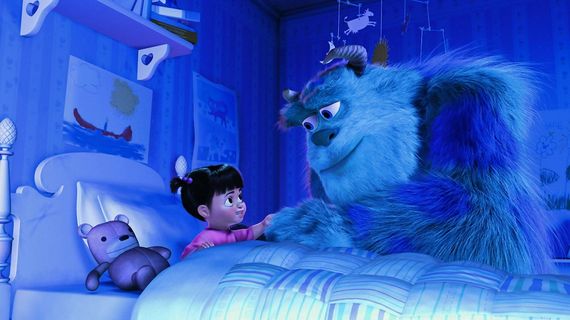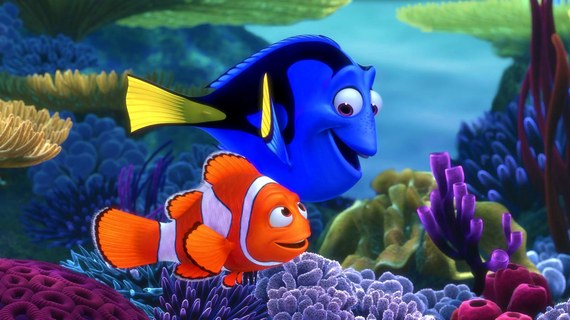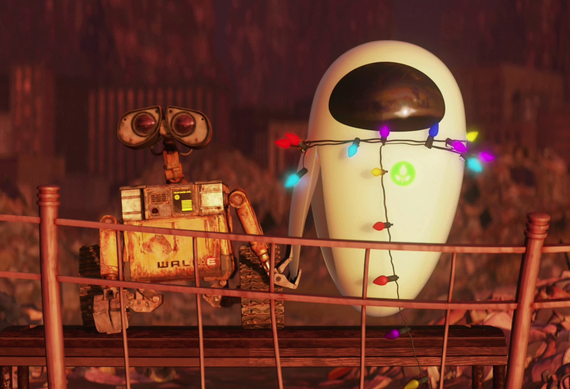The arrival of Toy Story--and by extension Pixar Animation Studios--in 1995 forever changed how we see movies. Not since Snow White and the Seven Dwarves has the medium of animation been so significantly rocked, as new technology brought colorful CG to audiences for the first time ever. In a decade, CG would replace hand-drawn 2D animation as the dominant medium at Walt Disney Animation Studios, and the animation world would remain forever transformed.
But Pixar's legacy doesn't begin and end with technology. Sure, Toy Story ushered in a new visual medium, but it also shook up the animated feature film world in much more fundamental ways. Pixar eschewed the tradition of fairy tales, sing-a-longs, and overly kid-oriented storytelling in favor of a more bold and mature approach. The folks at Pixar--headed up by the future "brain trust" of John Lasseter, Andrew Stanton, Pete Docter, and the late Joe Ranft--moved forward with the idea that animated films weren't only for kids, and kids don't need (or want) to be talked down to. Story, character, and emotion are king, and if you nail all three without pandering, you just might have something special on your hands.
That formula was repeated time and time again, as Pixar forged ahead with what seemed to be an impossible track record of greatness. The stumbles came eventually, inevitably, but the studio is always pushing ambitious ideas, and 2015 is the first time in history where we saw two Pixar films released in the same year.
To mark the release of the studio's 17th feature film, Finding Dory, now seems like an opportune time to look back at how Pixar's oeuvre stacks up so far. Without further ado, Collider presents a complete ranking of all the Pixar films from worst to best.
16.) Cars 2
While Pixar's track record isn't pristine anymore, Cars 2 is its only real out-and-out failure. There's no way around it: this is a bad movie. It's juvenile, devoid of heart and wonder, and it feels perfunctory. Even some of Pixar's lesser films are better than most animated movies from other studios, but not Cars 2--it's just as bad as a lackluster effort from DreamWorks Animation. It's tough to know what exactly went wrong here. We know Pixar is capable of making good sequels, and when John Lasseter stepped in to take over the director's chair from Brad Lewis there was the hope that he was "fixing" things. But in the end, it appears this thing was unsalvageable. The one saving grace is that the animation is pretty spectacular. But with Pixar, pretty ain't enough.
15.) The Good Dinosaur
While the 2015 entry The Good Dinosaur scored more positive reviews than Cars 2, it stands as the studio's lowest grossing film in history by far--which is even more striking when taking into account that Pixar films released over a decade earlier, without the benefit of 3D ticket prices, made more money. But ultimately what matters is the film, not the box office, and unfortunately The Good Dinosaur is a complete and utter snoozefest. The picture famously went through an incredibly tumultuous production that led to director Bob Peterson's removal and an entire creative reworking from the ground up. First time filmmaker Pete Sohn took the reigns, and while the film's emotional ambition is admirable, it suffers from a whiny, unlikeable protagonist in Arlo, the titular good dinosaur. Which is a massive problem seeing as how Arlo commands the majority of the screentime with the dialogue-less Spot.
The movie bathes itself in Western genre tropes and aesthetics, which isn't an issue unto itself--Pixar tackling a Western is exciting!--but again when your whole movie hinges on a protagonist as insufferably dumb as Arlo, the slower pace becomes a hindrance. From a technical perspective, The Good Dinosaur is jaw-droppingly gorgeous, although the decision to juxtapose photo-real settings with cartoonish dinosaur designs is still one of the studio's more befuddling choices. Ultimately, while the finale is admirably earnest and The Good Dinosaur's heart is in the right place, as a movie it's an absolute chore to get through, with characters and story that are far from the tightly structured Pixar we've come to know and love.
14.) A Bug's Life
Toy Story was a massive success, but while in production, the folks at Pixar didn't know that it was going to work, let alone whether they'd ever make another CG film. Their follow-up effort, A Bug's Life, feels like it's the studio still trying to figure out what kinds of movies it makes, and as a result their sophomore feature is less inspired than their first film. It's adequate enough--it's not a bad movie--but it's possibly Pixar's most forgettable. "Oh yeah, A Bug's Life. That movie's fine," is a common refrain, but no worries--Pixar recovered and solidified its status as a force to be reckoned with in its next two features.
13.) Brave
After first breaking out by not doing what every other animated film was doing, in 2012 it was time for Pixar to try its hand at its first ever fairy tale. Brave was one of the more promising efforts from the studio, with a female protagonist, Scottish setting, and folklorish tone in tow. But the finished film is a movie that doesn't really know what it wants to be. The clan stuff is convoluted to the point of becoming boring, and the "bear" twist takes the film to some odd territory.
There are moments of genuine sweetness between Merida and her mother, and the animation is Pixar's best by far (those landscapes are gorgeous), but the story unfortunately falls short. It's maybe too ambitious for its own good, and when director Mark Andrews stepped in to replace Brenda Chapman, it feels like he was more interested in bombast and slapstick than the mother-daughter aspect. Which is fine--the action sequences are great--but the film feels at odds with itself as it's reaching for too much all at once.
12.) Monsters University
Pixar's first prequel--a result of the studio's agreement with Disney that sees Pixar creating one prequel/sequel for every two original films--had the advantage of starting with some of the studio's most beloved characters and throwing them into a setting Pixar had never tackled before: college. The results are quite good, and kudos to director Dan Scanlon and his team for pulling off the ballsy message of "You can't be whatever you want to be." The movie is funny and full of great character designs, and the message is solid, but there's something about Monsters University that holds it back from greatness. It could simply be that it was released during a period in which Pixar's track record was most definitely broken--Cars 2 and Brave were nowhere near the levels of greatness we'd come to expect, and few thought Monsters University would be the film to get the studio back on track.
But Pixar's phenomenal streak in the late 2000's gave us three incredibly emotional films, and while Monsters University is somewhat moving, it lacks the tear-jerking pull of the studio's most memorable efforts. Perhaps that's why it didn't quite leave a strong mark on audiences.
11.) Cars
Cars is the Pixar movie that you think you hate, but is actually kind of okay. In retrospect, the stink of Cars 2 might have something to do with that, but you know what? It's not that bad. The problem with Cars is that it lacks significant stakes, so there's not really a huge sense of momentum. But that's kind of in keeping with the film's laid-back tone. The scenery is gorgeously crafted, and while the characters aren't especially memorable, they're nevertheless endearing. There's still the haunting question of "Where the hell are all the people? Did the cars eat them? Why are there door handles?" and the movie has one too many endings, but exploring the loss of America's working class is actually one of the studio's most adult and ambitious themes. It's all right to admit it: Cars is a sweet and perfectly OK movie.
10.) Toy Story 2
Honestly, when it comes to ranking the Toy Story films, they're a bit interchangeable. All of them are great, and Toy Story 2 impossibly so. The film was entirely reworked just months before release, with John Lasseter taking over as director and crafting a completely new story that riffs on the culture of toy collectors while also expanding the Toy Story mythology in a way that feels organic. Moreover, the "When Somebody Loved Me" sequence laid the foundation for the emotionally tough territory that Pixar would continue to mine in its subsequent efforts.
9.) Toy Story
The film that started it all still holds up after all these years. It's such a simple conceit--a buddy comedy set in the world of toys--but director John Lasseter and his team execute it brilliantly. What could easily have devolved into a nostalgia fest is treated with plenty of care for character, as the film plays on the audience's personal memories of childhood toys without relying on it for the emotional hook. It's easy to forget just how groundbreaking Toy Story was, but looking back at the cinematic landscape that it entered, one appreciates the gumption of this scrappy group of animators and cinephiles who dared to make something so strikingly different.
8.) Ratatouille
Quite possibly one of the most important films to Pixar, Ratatouille was in the development stages when the relationship between Pixar and Disney was at its most contentious, and Pixar was actively seeking another distribution partner. Because of this, 2007's Ratatouille could have been the first non-Disney effort from Pixar, so the animation studio wanted to make sure they got this one absolutely right. The film also proved that Pixar could weather production difficulties and a change in director without Lasseter himself taking over, as Brad Bird was enlisted to rework the picture following the departure of Jan Pinkava.
The result is quite possibly Pixar's most "grown up" movie. It's not often you hear kids clamoring for more Ratatouille merchandise, but Bird and Co. crafted a delicious-looking feature that--taking a cue from its thematic throughline--is not afraid to stand out in a crowd.
7.) Toy Story 3
While the first two Toy Story films are swell, the franchise really coalesced into something nearing perfection with Toy Story 3. The film addresses issues as dark as mortality, the passing of time, and broken relationships, and it really goes there with its villain (i.e. no redemption arc), all under the guise of an animated sequel to one of the most successful franchises of all time. Pixar and director Lee Unkrich refused to play it safe, and that decision pays off in spades as the film builds to not one but two emotional climaxes that tug at the heartstrings. These toys aren't simply co-workers; they're friends who've been to hell and back together, and Toy Story 3 really digs deep into that conceit. It's also straight-up hilarious. Mr. Tortilla Head is one of the more brilliant ideas Pixar's ever put on screen.
6.) Up
Though one of Pixar's earlier efforts had also ventured into new territory by tackling a highly emotional story point up front, Up takes the cake for earliest "bawl your eyes out" moment. The opening montage of Pete Docter's colorful and sweetly sad adventure film is not only one of the most emotionally impactful sequences in the history of animation, but also one of the most mature. Audiences young and old equally understand the importance of what's happening without the need for dialogue or voiceover narration, which speaks to the talent of Docter and his team.
While Up fails to match that emotional high (or low) point in the rest of its story, the film still succeeds as a delightful mismatched buddy picture/tale of loneliness that also eschews tradition in favor of breaking new ground with its geriatric hero.
5.) Inside Out
There was a lot riding on Inside Out. Pixar hadn't had a universally beloved film in five years, and if any film had the potential to be a "return to form", it was the next feature from studio stalwart Pete Docter. And boy did the filmmaker deliver. Inside Out is not only brilliantly structured, it's wildly entertaining, hilarious, and unique--the latter of which is an increasingly rare commodity. But what makes Inside Out special is the thing that makes the best Pixar movies special: it's tackling mature subject matter with a high degree of emotional intelligence, not talking down to kids or simply feeding folks a giant bowl of sugar.
The film is sweet to be sure, but it's also somewhat heartbreaking and, ultimately, uplifting in the way it unabashedly considers the complexity of emotions. One of its key messages--that all emotions make us who we are, not just the "good" ones--is some serious stuff, even for adults. To straight up explain to kids the value of sadness instead of offering a "turn it off"-like suggestion to just be happy instead is bold, and that ambition is something that had been missing from the studio for a while (although Monsters University has its moments). 20 years after the studio began its terrific run, it manages to craft one of its very best films in Inside Out.
4.) The Incredibles
Brad Bird was the first "outsider" to make a film at Pixar. The core group of filmmakers that pioneered the Pixar brand directed all the movies prior to The Incredibles, so all eyes were on what the director behind the classic The Iron Giant would bring to the fold. Something incredible, it turns out. Superhero movies were on the rise in 2004, but Bird actually brought something unique to the table by asking what it means to be "great" in a world where uniqueness is frowned upon. Bird wasn't afraid to portray a married couple that is sexually attracted to one another and the film constantly surprises with a story structure that keeps the audience on its feet. Throw in some absolutely magnificent, 60s-inspired production design, a wonderful score by Michael Giacchino that plays on tropes of the spy genre (as does the rest of the film), and the highest stakes of any Pixar film yet, and the result is absolutely one of Pixar's best.
3.) Monster's Inc.
In 2001, Pixar had tackled the world of toys and bugs, but now it was time for them to go somewhere a bit more adventurous: a world that doesn't exist. What could've been a silly, pandering, "Look at all these designs!" monster movie became a sweet, hilarious tale of loneliness and love in the hands of director Pete Docter. Of course Boo is adorable and Billy Crystal's Mike Wazowski is incredibly funny, but Monster's Inc. forges difficult territory as it subtly tackles the seemingly perfect but realistically lonely life of Sully, and how the experience of caring for another being fills a hole in his heart.
Monster's Inc. can be viewed as a buddy picture or a friendship tale, but it's really a story about love. The fact that it revolves around the relationship between a big blue monster and a human girl who can't form complete sentences, and that it totally works is a testament to the talent of Docter and his team. This is the movie that proved Pixar wasn't a one-trick pony, and it would be a foundational hallmark for its films to come.
2.) Finding Nemo
Finding Nemo is, by all accounts, Pixar's "populist" movie. While the studio has certainly found success since, no movie has captured the zeitgeist so fully and so permanently as Nemo. In the bonus features on the Blu-ray, co-writer/director Andrew Stanton says Nemo wasn't the "sexy" movie at Pixar during development--everyone was talking about The Incredibles, not this cutesy little fish movie. But Stanton ended up surprising almost everyone with a film that absolutely exploded upon release and is a cultural hallmark to this day.
All the elements really come together perfectly to make Finding Nemo a fully enrapturing experience. There's a sense of wonder to be culled from the visuals paired with Thomas Newman's dynamic score. This is a father-son story, an adventure film, and a reluctant hero picture all rolled into one, and Stanton combines these elements beautifully to culminate in an emotion-filled finale that leaves a lump in my throat every. single. time.
1.) WALL-E
Pixar's masterpiece is bold in every sense of the word. No dialogue for the first half hour, cinematography full of imperfections, and a major location change for the final two acts. It takes a certain skillset to make audiences fall in love with a robot, but co-writer/director Andrew Stanton pulls it off magnificently. While WALL-E is absolutely a critique on the apathy and wastefulness that plagues our current society, at heart it's a love story between WALL-E and EVE. This is one of the most famous onscreen couples in history, and neither one of them speaks in complete sentences.
The film also brilliantly subverts expectations, as WALL-E is neither a reluctant hero nor someone who's always aspired to greatness. WALL-E is a kind, gentle soul who's simply in love. He's just been doing what he was built to do all these years on Earth, collecting things he finds interesting along the way and dreaming of companionship. He becomes the film's hero in the end not out of confidence or a desire to win the heart of his maiden fair--he becomes a hero because he's altruistic; because he's kind. It's a deceptively simple idea executed to perfection, and that's why it's Pixar best film...so far.
Words by Adam Chitwood for Collider.com
